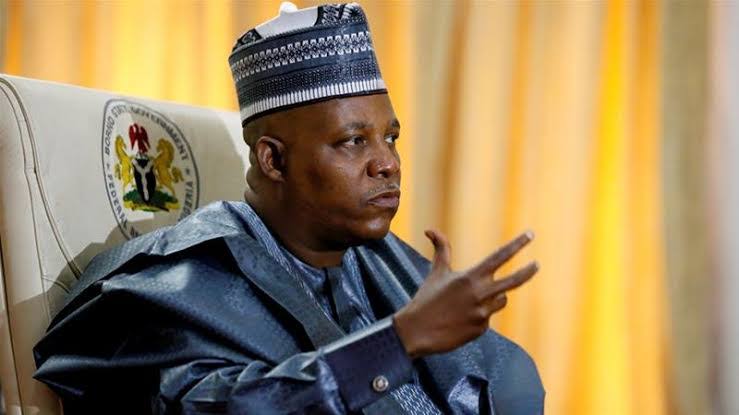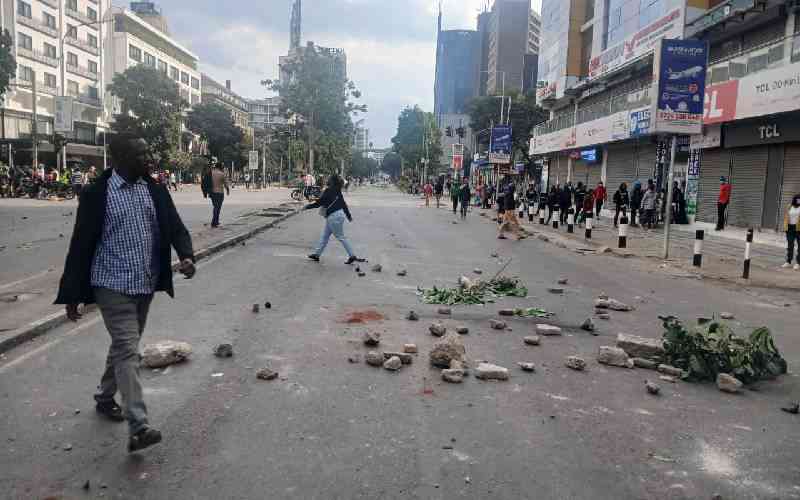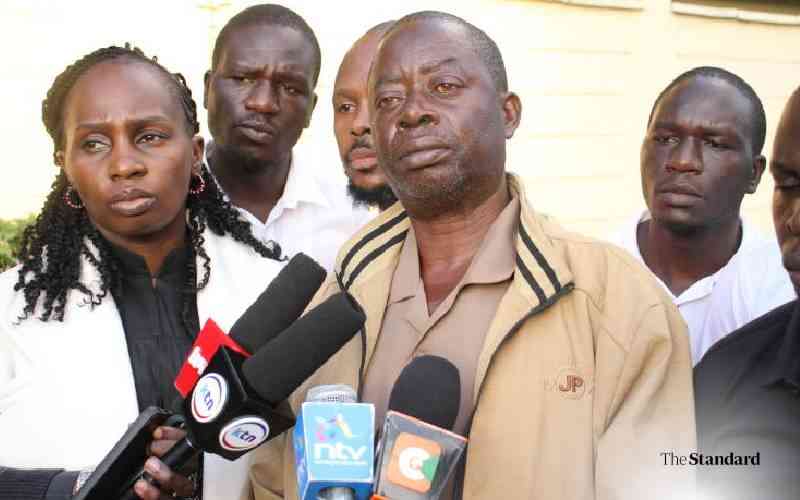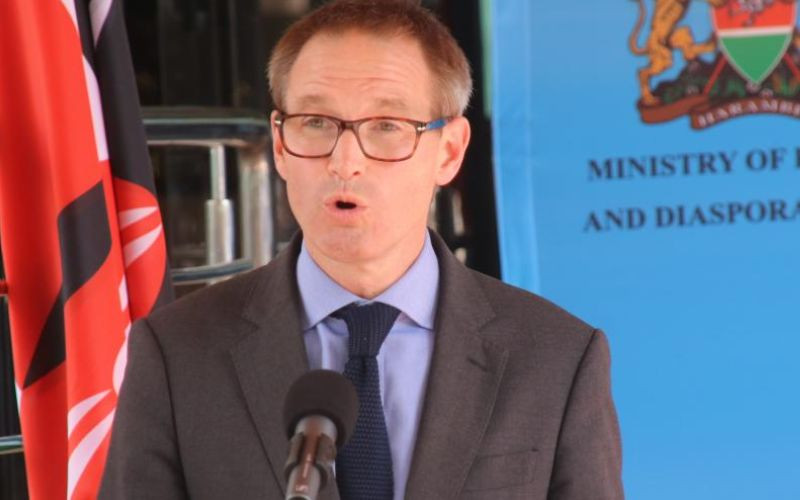Kenya | Lighting the memory of the protests
Just as we were finalising this piece, yet another tragedy struck. The violence we thought we were remembering came crashing back into the present. On June 7–8, 2025, while in police custody in Nairobi, 31-year-old Kenyan teacher and activist Albert Ojwang died under suspicious circumstances after publicly accusing a senior police official of corruption. The official story? That he banged his head against a wall. The autopsy told a different truth: signs of strangulation, blunt force trauma, and wounds across his body — all pointing to something far more violent and deliberate.
Albert Ojwang’s death comes amidst a growing government crackdown on civil society in Kenya. Last year, the Kenya Human Rights Commission condemned the state for repeatedly disregarding the constitution, citing cases of extrajudicial killings and arbitrary arrests.
His killing is an all-too-loud reminder that the struggle didn’t end last year — it’s still happening now. It’s ongoing, unfinished, and dangerously unresolved. It continues to play out in police cells, on timelines, in courtrooms, and in the silences of those in power.
In June 2024, the spirit of Kenyan youth surged through that country’s streets, embodied in the powerful demonstrations that swept the nation. Sparked by outrage over the proposed Financial Bill—a symbol of economic oppression—the protests quickly evolved into a nationwide awakening. Thousands of young people mobilised, offline and online, rejecting the burdens of bad governance under William Ruto and his administration, which has come to represent a widening gap between political promises and lived realities. The chants echoed frustrations over rising taxes, lack of job opportunities, and rampant corruption—issues that had for far too long simmered beneath the surface.
The protests were met with violence. Many paid with their lives, others with their freedom.
Investigations later revealed the horrifying toll of the countrywide protests, with one of the most devastating moments occurring in just a single day, when six people were killed as police—including plainclothes officers without identification—opened fire on unarmed protesters outside Parliament in Nairobi. Over the course of the months-long demonstrations, more than 60 people lost their lives. Amnesty International Kenya documented excessive use of tear gas, beatings, and arbitrary arrests—evidence of a broader pattern of state repression.
These were not isolated incidents. They reflected a deepening crisis in human rights policies and policing in Kenya that demands action. From afar, as members of the Kenyan diaspora, we watched with a mix of grief, pride, and helplessness. Now, one year on, the question is not just how we remember—but how we act.
Diaspora activism has historically been a catalyst for global awareness and pressure. We need only look at the anti-apartheid movement of the 1980s, where exiled South Africans and their allies abroad played a critical role in mobilising international sanctions, shaping public discourse, and ultimately helping to dismantle a system of racial oppression. Their efforts remind us that distance does not dilute responsibility — it can amplify it. For those of us in the diaspora, particularly in countries like the Netherlands, remembrance must mean more than symbolic gestures. We are positioned in places where foreign policy is made, where trade missions shake hands with regimes our people resist. We must leverage that position — not only as a moral obligation to our homeland but as a strategic tool to hold power accountable where it most comfortably hides.
The idea of international accountability is often treated as something abstract—a matter of tribunals, declarations, and distant institutions. But for those of us here in the diaspora, we recognise daily that, while we are physically removed from the repression and injustice unfolding in our countries of origin, we remain very much bound to them. In the wake of the June 2024 protests, Kenyan diaspora groups in the Netherlands came together in an unprecedented way—organising peaceful demonstrations in The Hague, hosting civic education forums in Amsterdam, and building broad-based coalitions.
More recently, during the preparations for the Dutch Royal State Visit to Kenya in March 2025, we mobilised around a petition calling for the visit’s reconsideration, urging the Dutch government not to overlook Kenya’s deepening democratic crisis. The visit came at a time when Kenyan activists, human rights defenders, journalists, and protesters were — and still are — under siege. The state is growing increasingly hostile to public accountability. Our petition drew significant media attention and opened doors to high-level conversations. A section of us met with Dutch MPs and engaged the Ministry of Foreign Affairs through the Dutch Human Rights Ambassador to raise the alarm about rising authoritarianism in Kenya. We challenged the logic of depoliticised trade missions and asked: What is the Dutch government prepared to do when its partners cross red lines?
One key reflection I’ve had throughout all of this is that standing in solidarity with Kenyans — and other oppressed communities in so-called “far away” countries — isn’t just about supporting them; it’s also about protecting shared values that ultimately benefit us all. Values-based relationships between peoples, rooted in justice and mutual accountability, offer more stability and hope than the shortsighted, transactional ties often forged between governments and regimes. Too often here in the Netherlands, we hear endless complaints about refugees and migrants, yet there is little acknowledgement that authoritarian leaders and failing states elsewhere are the ones driving people from their homes.
Bad governance doesn’t stay contained within borders; it spills over, undermining our global capacity to confront urgent challenges like climate change, pandemics, and rising inequality. In an interconnected world like the one we live in today, staying silent in the face of repression abroad doesn’t protect us; it makes us all more vulnerable.
Selective engagement must be called out. Especially in a country like the Netherlands, which recently celebrated Liberation Day on the 5th of May, a national moment to remember the fight against fascism and the value of freedom. Yet, months earlier, the Dutch Royal Couple visited Kenya, a country still reeling from the killing, abduction, and silencing of protestors. How can a nation that hosts the International Criminal Court — a supposed symbol of global justice — turn a blind eye when its own allies cross the line? The contradiction is hard to ignore. During one of Kenya’s darkest hours — the 2007–2008 post-election violence that left over 1,000 people dead and displaced hundreds of thousands — we looked to the Netherlands for justice. One of the central figures in that legal process, William Ruto, then accused of crimes against humanity, is now the Kenyan head of state. That history cannot be ignored — nor can the present contradictions.
These contradictions aren’t just political oversights—they are moral failures with real, human consequences, and that failure is felt most deeply in moments like this, as we remember the lives lost, the voices silenced, and the extraordinary courage it took to rise up.
As we mark one year since June 2024, we do not want to simply remember the chants and the courage — we want to honour them with continued pressure, with political engagement, with unwavering solidarity. For the diaspora, it is not just advocacy; it is an act of love for those we have left behind at home, of resistance and responsibility, because our distance does not absolve us; it demands more of us. We are active participants in shaping the future of our countries and will continue to push for a world where justice and accountability are not optional, but essential.
Jaya Khamala is a Kenyan advocate for human rights and good governance, based in the Netherlands.












